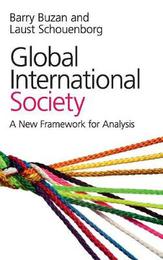
|
Global International Society: A New Framework for Analysis
Hardback
Main Details
| Title |
Global International Society: A New Framework for Analysis
|
| Authors and Contributors |
By (author) Barry Buzan
|
|
By (author) Laust Schouenborg
|
| Physical Properties |
| Format:Hardback | | Pages:286 | | Dimensions(mm): Height 235,Width 156 |
|
| ISBN/Barcode |
9781108427883
|
| Classifications | Dewey:301 |
|---|
| Audience | | Professional & Vocational | |
|---|
| Illustrations |
Worked examples or Exercises
|
|
Publishing Details |
| Publisher |
Cambridge University Press
|
| Imprint |
Cambridge University Press
|
| Publication Date |
23 August 2018 |
| Publication Country |
United Kingdom
|
Description
This ambitious book provides a new framework for analysing global international society (GIS). In doing so, it also links the English School's approach more closely to classical sociology, constructivism, liberal institutionalism, realism and postcolonialism. It retells the expansion of international society story to explain why the differences among states are as important as their similarities in understanding the structure and dynamics of contemporary GIS. Drawing on differentiation theory, it sets out four ideal-type models for international society. These cover the 'like units' of the classical English School, as well as differentiation by geography, hierarchy/privilege, and function. These models offer a systematic way to integrate international and world society, and to understand the relationship between the deep structure of primary institutions, and the vast array of intergovernmental and international non-governmental organisations. In this pioneering book, Buzan and Schouenborg present the reader with the first systematic attempt to define criteria for assessing whether international society is becoming stronger or weaker.
Author Biography
Barry Buzan is Emeritus Professor in the London School of Economics and Political Science Department of International Relations, honorary professor at Copenhagen, Jilin, and China Foreign Affairs Universities, and a Fellow of the British Academy. Among his 26 books are: From International to World Society? English School Theory and the Social Structure of Globalisation (Cambridge, 2004); An Introduction to the English School of International Relations (2014); and, with George Lawson, The Global Transformation: History, Modernity and the Making of International Relations (Cambridge, 2015, winner of Francesco Guicciardini Prize for Best Book in Historical International Relations 2017). Laust Schouenborg is Associate Professor of Global Studies in the Department of Social Sciences and Business at Roskilde Universitet, Denmark. He has authored The Scandinavian International Society: Primary Institutions and Binding Forces, 1815-2010 (2012) and International Institutions in World History: Divorcing International Relations from the State and Stage Models (2016), and contributed to Guide to the English School in International Studies (2014, eds Navari and Green).
Reviews'Buzan and Schouenborg have over-reached the Westernisation story with four pluralistic models of the expansion of international society, enriching the English School's theoretical corpus. Building on them, they theorise the differentiations of state type and of geography, status and function that have produced the basic structures of today's global international society. A must-read for anyone interested in the post-colonial condition.' Cornelia Navari, University of Buckingham 'Buzan and Schouenborg have succeeded in dealing with one of the most straightforward, yet most difficult, questions for international relations theorists in general and English School thinkers in particular: what is global international society? The impressive historical, analytical, and theoretical rigour of this volume will be a reference point for all those interested in how norms, institutions, and the overall social structure of world politics originated and evolved in the past, are strengthening or weakening in the present, and may change in the future.' Filippo Costa Buranelli, University of St Andrews
|